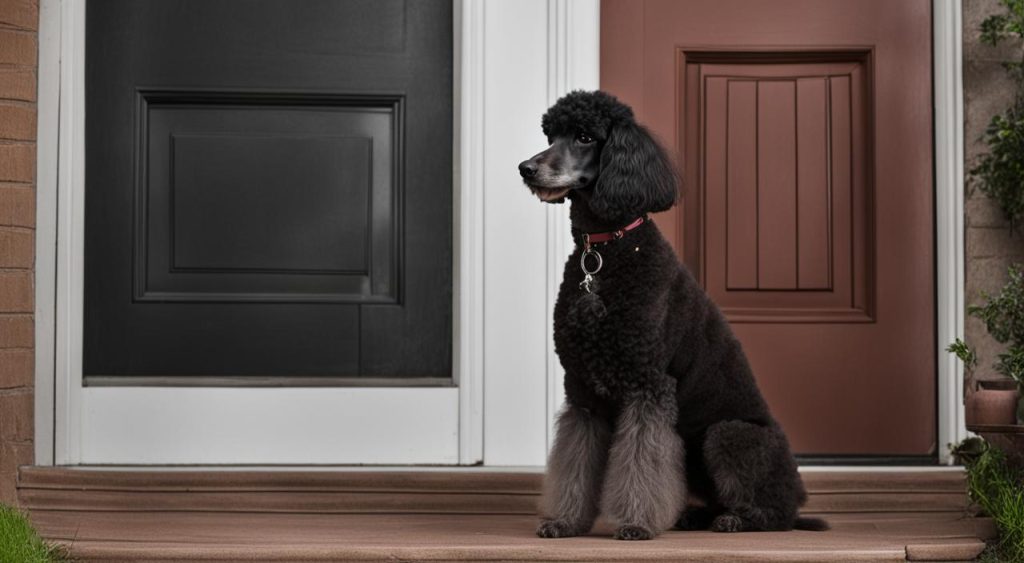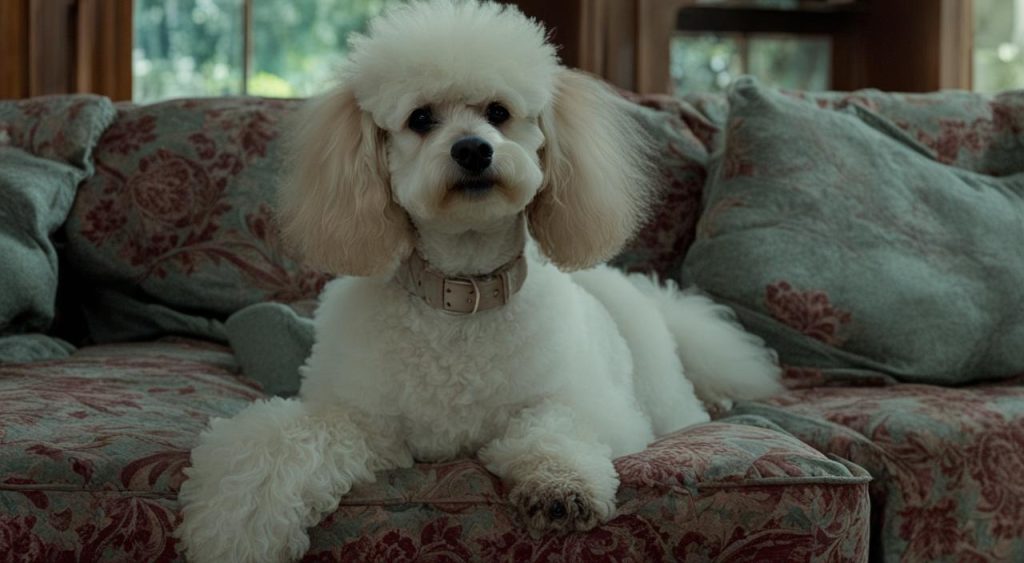If you’re a Poodle owner, you may have wondered whether your furry companion can be left alone without experiencing distress. It’s important to understand that some dog breeds, including Poodles, may struggle with being left alone for long periods of time. Poodles, especially Toy Poodles, can become overly dependent on their owners and develop severe separation anxiety if left alone for extended periods.
Leaving a Poodle at home alone for hours can lead to negative behaviors such as accidents in the house and destructive behavior. While Poodles are known for their intelligence and independence, they still crave companionship and can experience stress and fear when left alone.
It’s not just Poodles that may have difficulty being left alone. Other dog breeds known to have a higher tendency for separation anxiety include Australian Shepherds, American Pit Bull Terriers, Chihuahuas, Bichon Frises, Italian Greyhounds, Maltese, French Bulldogs, Fox Terriers, and Pomeranians. However, it’s important to note that any dog, regardless of breed, can experience separation anxiety.
Key Takeaways:
- Poodles, especially Toy Poodles, can become overly dependent on their owners and develop severe separation anxiety if left alone for extended periods.
- Leaving a Poodle at home alone for hours can lead to negative behaviors such as accidents in the house and destructive behavior.
- Australian Shepherds, American Pit Bull Terriers, Chihuahuas, Bichon Frises, Italian Greyhounds, Maltese, French Bulldogs, Fox Terriers, and Pomeranians are other dog breeds known to have a higher tendency for separation anxiety.
- Any dog, regardless of breed, can experience stress and fear when left alone.
Signs of separation anxiety in Poodles
Poodles with separation anxiety may exhibit a range of behaviors that indicate their distress and anxiety when left alone. These behaviors can include:
- Incessant barking: Poodles may bark continuously when left alone as a way to express their anxiety and seek attention.
- Destructive behavior: Poodles may chew on furniture, shoes, or other household items when left alone, which can be a result of their anxiety and attempt to alleviate stress.
- Depression: When separated from their owners, Poodles with separation anxiety may become lethargic, withdrawn, and display signs of sadness or depression.
- Crying: Poodles may whimper, howl, or cry when left alone, as a way to express their distress and seek comfort.
- Frenzied behavior when the owner leaves: Poodles with separation anxiety may exhibit frantic and hyperactive behavior when their owners are preparing to leave the house.
- Over excitement when the owner returns: Upon their owner’s return, Poodles with separation anxiety may become excessively excited and display intense displays of affection and attention-seeking behavior.
- Increase in housebreaking accidents: Poodles may have accidents in the house, even if they are typically well-trained, when experiencing separation anxiety.
It is crucial for Poodle owners to recognize these signs and take steps to help their furry companions cope with being alone.
Helping Poodles Cope with Being Left Alone
When it comes to leaving your Poodle alone at home, creating a supportive environment can make all the difference in helping them feel safe and secure. Here are some strategies to consider:
Provide interactive toys and treats: Leaving toys that engage and stimulate your Poodle’s mind can help distract them and alleviate boredom while you’re away. Puzzle toys and treat-dispensing toys are great options to keep their attention.
Familiar objects: Leaving familiar items, such as a blanket or a piece of clothing with your scent, in their designated area can provide comfort and promote a sense of security.
Background noise: Some Poodles find comfort in having background noise when left alone. Leaving a TV or radio playing softly can create a soothing atmosphere and help mask any unfamiliar sounds that may trigger anxiety.
Your Poodle’s surroundings can also play a role in their comfort:
Window view: If possible, allowing your Poodle to see outside through a window can offer them a sense of connection to the outside world and reduce feelings of isolation.
Lighting: Some Poodles may feel more at ease with a light turned on, especially if they have a fear of the dark. Soft lighting can create a calming atmosphere in their space.
Establishing a routine and consistent schedule is essential for helping your Poodle cope with being alone:
Consistency: Stick to a set routine when leaving and coming home so that your Poodle knows what to expect. Avoid making a big fuss when leaving or returning, as this can reinforce their anxiety and make goodbyes more difficult.
Gradual alone time increase: If your Poodle experiences severe separation anxiety, gradually increasing the time they spend alone can help them build independence. Start with short periods and gradually extend the duration over time.
Remember, every Poodle is unique, so it’s important to find what works best for your furry friend. By implementing these strategies and being attuned to your Poodle’s needs, you can help them feel more secure and confident when left alone.
Conclusion
Managing separation anxiety in Poodles is crucial for their well-being and your peace of mind. While Poodles, like any dog breed, may struggle with being left alone, there are effective strategies you can implement to help them cope.
Creating a comforting environment for your Poodles when they are alone is essential. This can include leaving interactive toys, treats, and familiar objects in their designated area. Providing background noise, such as a TV or radio, can also help soothe their anxiety.
Establishing a consistent routine is another vital step. Avoid making a big fuss when leaving and coming home, as this can increase their stress levels. Gradually increase the amount of time they spend alone, allowing them to build confidence and independence over time.
Remember, every Poodle is unique, and what works for one may not work for another. If you’re struggling to manage your Poodle’s separation anxiety on your own, don’t hesitate to seek guidance from a veterinarian or professional dog trainer. They can provide valuable insights and techniques to help you and your Poodle navigate this common challenge.





